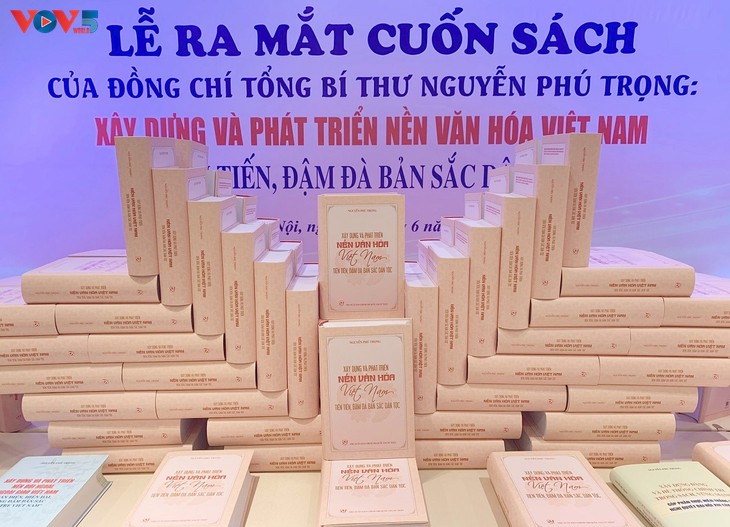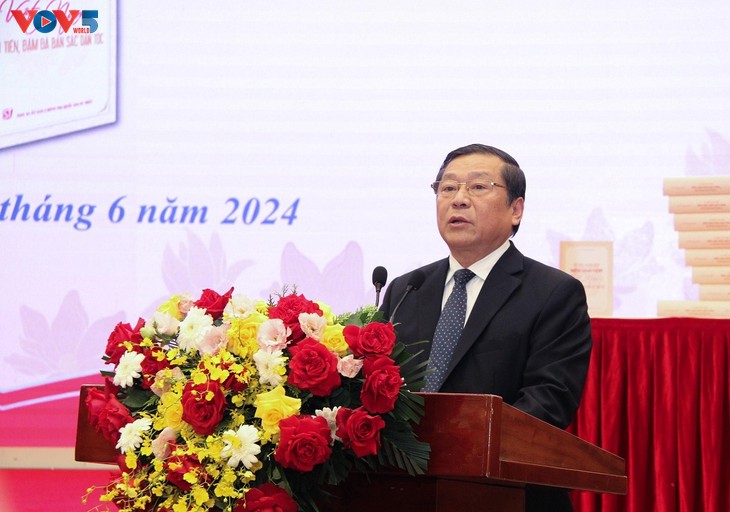(VOVWORLD) - The book "Building and Developing an Advanced Vietnamese Culture Embracing National Identity" by Party General Secretary Nguyen Phu Trong, published on June 21, highlights the maturity and development of the Communist Party of Vietnam's theoretical thinking and leadership in cultural development. It demonstrates the vision of cultivating an advanced Vietnamese culture rich in national identity.
 The book "Building and Developing an Advanced Vietnamese Culture Embracing National Identity" by Party General Secretary Nguyen Phu Trong was published on June 21, The book "Building and Developing an Advanced Vietnamese Culture Embracing National Identity" by Party General Secretary Nguyen Phu Trong was published on June 21, |
The 13th National Congress of the Communist Party of Vietnam in 2021 emphasized cultural development as the spiritual foundation that strongly arouses patriotism, national self-reliance, great unity, and aspiration toward a prosperous and happy country. The book includes 92 articles, speeches, talks, excerpts, and interviews by the General Secretary, systematizing the Party's leadership and direction in building and developing an advanced Vietnamese culture rich in national identity.
Vietnamese culture embracing traditional and contemporary elements
The culture that Vietnam is building is advanced, rich in national identity, unified in diversity, and based on progressive and humane values. Marxism-Leninism and Ho Chi Minh's Thought play a leading role in social-spiritual life, while Vietnam also continues and promotes the traditional values of all ethnic groups in the country and absorbs the achievements and essence of global culture. Throughout this process, people are placed at the center of the development strategy, while cultural development and humans are both the goal and driving force of renewal.
The General Secretary's book outlines the national values of peace, unity, independence, prosperity, strength, democracy, justice, civilization, and happiness. The cultural value system includes ethnicity, democracy, humanity, and science. The family value system emphasizes warmth, happiness, progress, and civilization.
Vietnamese human standards in the new era embrace patriotism, solidarity, self-reliance, gratitude, honesty, responsibility, discipline, and creativity. These core values, continued and developed from national tradition, are based on Marxism-Leninism, Ho Chi Minh's Thought, and Party Congresses. Building these value systems is essential for Vietnam to consolidate its ideological foundation, revive its culture, and contribute to national development through soft power and endogenous strength.
Professor Dr. Phung Huu Phu emphasized the significance of Party leader Nguyen Phu Trong’s book: “It is a profound theoretical and practical work, laying the foundation for the formation and development of our Party's theory on building and developing a new culture in a new period of development.”
Culture is the people's cause
According to General Secretary Nguyen Phu Trong, culture is fundamentally the people's cause. He emphasized that every individual must participate in and contribute to the creation of both material and spiritual cultural values, making the national culture more refined and beautiful.
The General Secretary commended the significant contributions of people in all walks of life to preserving, building, and developing Vietnamese culture through patriotic emulation movements, cultural activities, and the establishment of grassroots cultural institutions. The preservation and promotion of cultural heritage also play a crucial role in this collective endeavor.
He further stressed the importance of encouraging the creativity of intellectuals, writers, and artists in developing national culture and arts, nurturing young talents, and appropriately honoring those who have significantly contributed to the cultural cause.
 Deputy Head of the Party Central Committee’s Commission for Education and Communications Lai Xuan Mon Deputy Head of the Party Central Committee’s Commission for Education and Communications Lai Xuan Mon |
Deputy Head of the Party Central Committee’s Commission for Education and Communications Lai Xuan Mon said: "The General Secretary's guidelines and perspectives on the major, profound strategic orientation of developing an advanced Vietnamese culture, rich in national identity, are highly dialectical. They meet the requirements of the new development period and serve as a handbook for successfully implementing the Resolution of the 13th National Party Congress, particularly regarding the strategy for cultural development."
In the context of the Fourth Industrial Revolution and the strong trend of globalization, which presents many intertwined challenges in preserving and promoting traditional cultural values, Vietnam's commitment to developing an advanced culture rich in national identity is crucial. This steadfast approach directly contributes to creating a unique cultural identity and provides advantages for building and developing a civilized and happy nation.